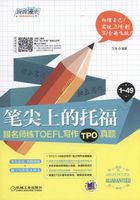
TPO 13
阅读解析与听力预测
总论:
private fossil collection对public和science都会造成不良影响。 下文肯定会展开分别说三个不同的坏处。
下文肯定会展开分别说三个不同的坏处。
坏处1:
private fossil collection使得公众没法看到重要的fossil,进而可能造成公众对fossil的interest loss。
坏处2:
private fossil collection使得science失去了很多重要的fossil,对研究有不良影响。
坏处3:
private fossil collection中collecting fossil的过程可能破坏了重要的证据。
听力解析
exaggerated,benefits…outweigh the disadvantages表明了听力的策略,坏处没那么大,好处大于坏处, 需记录。这预示下文肯定要谈谈privatefossiltrade的好处了。
需记录。这预示下文肯定要谈谈privatefossiltrade的好处了。
First of all,准备听对public的影响。greater exposure to fossils,直接反驳阅读,公众反而更能看到fossil,那接下来应该讲为什么。not less是废话。a lot of fossils available for purchase体现了原因,更多fossil被购买;“…as a result,even low-level public institutions…routinely buy…fossils and display them for the public.”把这个过程讲清楚了,因为有更多的fossil可买卖,有更多公立机构会购买fossil展出给大众,于是大众反而有更多机会见到fossil。
♦ 本段逻辑梳理:private fossil collection恰恰有利于公众接触更多fossil,因为这个过程当中会有更多的fossil可以被购买,于是很多低层次公立学校也开始大量买fossil,恰恰给了公众更多接触的机会。
As for the idea that scientists will lose access to really important fossils,准备听第二点,科学家跟fossil的关系。not realistic直接表明听力要和阅读相反。Before anyone can put a value…it needs to be scientifically identified,其实听到这儿这段的逻辑基本已经确定:要定价,得先科学检验,那谁来检验,肯定是科学家,所以科学家不会丢掉鉴定fossil的机会。the only people who can … are scientists是废话。by…examinations and tests其实也是废话。pass through the hands of…experts first还是废话。not…miss out on anything important也是废话总结。
♦ 本段逻辑梳理:private collection并不会让科学界损失接触fossil的机会,因为在私人定价之前,fossil必须先经过科学鉴定,而鉴定者显然只能是科学家。
Finally,准备听证据丢失。“whatever damage…collectors…do,if it weren't for them,many fossils would…undiscovered”这是令人惊讶的,她竟然承认会损失证据,说明她的策略不是否定坏处,而是说利大于弊,即发现化石的价值大于证据的损失。because…not that many fossil collecting…run by universities指出了为什么如果没有私人勘探,就会有很多化石不被挖掘。better for science…have more fossils…even if we don't have all the…data已经开始总结她的观点了,这个是可以预测的,不是必须记录的。
♦ 本段逻辑梳理:确实,证据会有所丢失,但是这个过程会让更多的fossil被勘探出来。因为很少有公立机构组织勘探,直接导致很多fossil无法被发掘。显然,发掘更多fossil的价值可以弥补某些fossil证据残缺的缺陷。
满分范文
The article expresses several concerns regarding the selling of fossils to private ownership. However,the lecturer believes that the benefits far outweigh its drawbacks.
To begin with, while the article worries that private ownership prevents the public from seeing certain valuable fossils, the lecturer argues that the new development has generated more exposure of fossils to the public. As a result, a lot more fossils are now available for purchase, which in turn allows even low-level public institutions and schools to buy fossils for public display.
Second, the lecturer simply does not believe that scientists are missing out on the opportunity to examine crucial fossil discovery. She points out that all fossils are placed with a commercial value only after they are scientifically evaluated, and of course the examination and test can only be done by professional scientists.
Last, although the lecturer admits that commercial fossil collectors do sometimes destroy scientific evidence, she still insists that the new development is more beneficial than harmful. According to her, in the past, many fossils were left undiscovered because there weren't many excavations run by universities. For her, the value of having more fossils found outweighs the occasional loss of some scientific data.